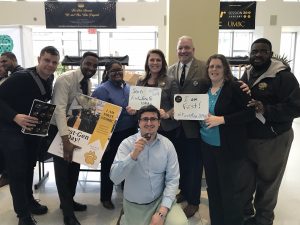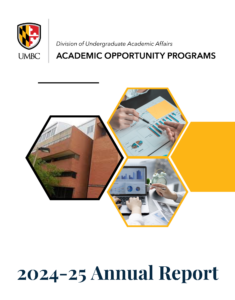What percentage of UMBC undergraduates identify as first-generation?
 While the percentage of first-generation undergraduate students has increased from 29% to 31% over the last five academic years, the number of students who identify as first-generation has grown by almost 300 students. The total number of first-generation students increased from 3,180 in Fall 2020 to 3,478 in Fall 2025, representing a 9% rise over five years, which mirrors the increase in undergraduate enrollment at UMBC.
While the percentage of first-generation undergraduate students has increased from 29% to 31% over the last five academic years, the number of students who identify as first-generation has grown by almost 300 students. The total number of first-generation students increased from 3,180 in Fall 2020 to 3,478 in Fall 2025, representing a 9% rise over five years, which mirrors the increase in undergraduate enrollment at UMBC.
While we don’t yet have a clean measure of the number of first-generation graduate students, at least 150 graduate students identify as FG college grads.
The FG population is also becoming increasingly racially and ethnically diverse, with growing representation from Hispanic and multiracial backgrounds. The percentage of first-generation students who identify as members of underrepresented minority groups (URM) rose from 42% in 2020 to 53% in 2025, a 26% relative increase. (Source: Population Term Summary, Fall 2025)
Which College has the largest number of First-Gen students at UMBC?
In Fall 2025, the College of Arts, Humanities, and Social Sciences (CAHSS) had the largest number (1,620) and percentage (36%) of FG students enrolled. For comparison, the percentage of all students enrolled in CAHSS and COEIT is about equal at 34% each. While the largest total number of FG students reside in CAHSS, in terms of individual majors, Comp Science and Engineering, and Information Systems lead with the most students enrolled (for both first-gen and all students).

What year was the First-Generation College Celebration Day first recognized nationally?

The First-Generation College Celebration was established in 2017 through a collaboration between the Council for Opportunity in Education (COE) and the NASPA Center for First-Generation Student Success, now First Gen Forward. It takes place annually on or around November 8, commemorating the signing of the Higher Education Act of 1965 by President Lyndon B. Johnson. This landmark legislation expanded access to higher education through federal financial aid and the creation of TRIO programs, which continue to support first-generation, low-income, and underrepresented students in pursuing and completing college degrees. Each year, the celebration unites institutions nationwide in recognizing how far first-gen students have come—and how critical their continued support remains.
First-Generation College Celebration Day is an annual national initiative that highlights and honors the experiences, achievements, and contributions of first-generation college students. The celebration aims to shift the conversation from a deficit-based narrative—focused on what first-gen students lack—to an asset-based perspective that recognizes their resilience, determination, and leadership. Colleges, universities, K–12 schools, community organizations, and employers across the country participate by hosting events, storytelling campaigns, and recognition activities that center the voices of first-gen students, staff, and alumni.
Which of these UMBC Initiatives is NOT a federally funded TRIO Program: McNair Scholars, Upward Bound, Student Support Services, First-Gen Network?
 TRIO is a set of federally funded programs in the United States designed to provide college access and support services to students from backgrounds that have been historically excluded from higher education. The programs are designed to help students overcome class, social, and cultural barriers to higher education. They are targeted to low-income individuals, first-generation college students, and individuals with disabilities. The programs provide a range of services, including academic counseling, tutoring, mentoring, financial aid assistance, and cultural enrichment activities. The goal of the TRIO programs is to help students succeed in their pursuit of a college education and improve their economic and social mobility. The TRIO Programs include Educational Opportunity Centers, Educational Talent Search, the Ronald E. McNair Postbaccalaureate Achievement Program (also known as the McNair Scholars Program), Student Support Services, Upward Bound, Upward Bound Math/Science, and Veterans Upward Bound.
TRIO is a set of federally funded programs in the United States designed to provide college access and support services to students from backgrounds that have been historically excluded from higher education. The programs are designed to help students overcome class, social, and cultural barriers to higher education. They are targeted to low-income individuals, first-generation college students, and individuals with disabilities. The programs provide a range of services, including academic counseling, tutoring, mentoring, financial aid assistance, and cultural enrichment activities. The goal of the TRIO programs is to help students succeed in their pursuit of a college education and improve their economic and social mobility. The TRIO Programs include Educational Opportunity Centers, Educational Talent Search, the Ronald E. McNair Postbaccalaureate Achievement Program (also known as the McNair Scholars Program), Student Support Services, Upward Bound, Upward Bound Math/Science, and Veterans Upward Bound.
For more information about UMBC’s TRIO Programs, please review our 2024-25 Annual Report